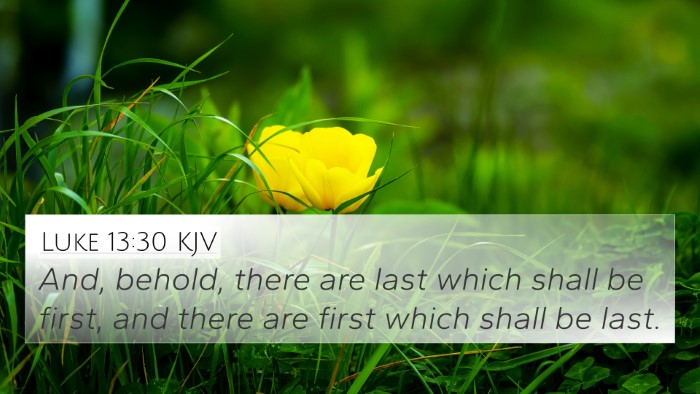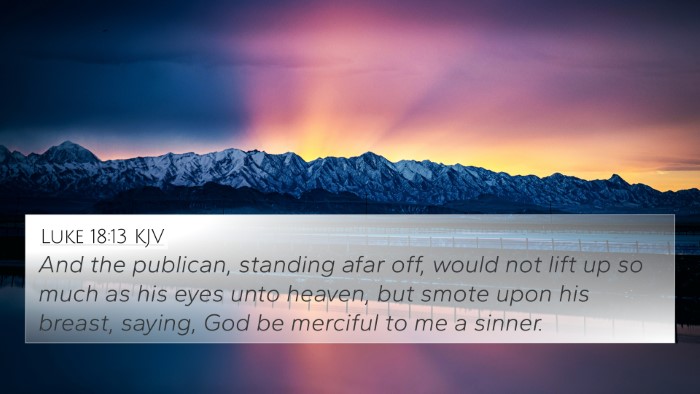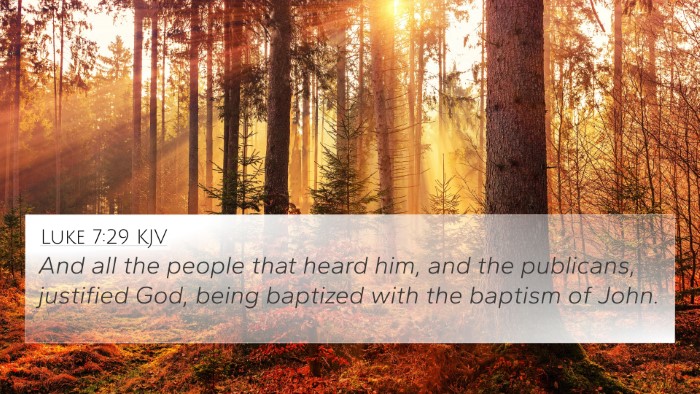Matthew 19:30 - Summary and Interpretation
Matthew 19:30 states, "But many that are first shall be last; and the last shall be first." This verse encapsulates a significant teaching of Jesus about the reversal of worldly expectations and values in the Kingdom of Heaven.
Understanding the Context
In this passage, Jesus is addressing His disciples after a discussion on the challenges of wealth and the difficulty for the rich to enter the kingdom of God. This statement serves as a profound conclusion to His teaching, illustrating the radical inversion of social and spiritual hierarchies.
- Matthew Henry Commentary: Matthew Henry emphasizes that this verse challenges the common understanding of success and prominence. In God's kingdom, those who humble themselves and serve others will be exalted.
- Albert Barnes Commentary: Barnes interprets the "first" and "last" as those in society who are esteemed versus those who are marginalized. He stresses the equality and grace of God, which turns human judgment upside down.
- Adam Clarke Commentary: Clarke highlights the principle of divine mercy, noting that those who appear to be least valued in society could possess the greatest reward in heaven.
Bible Cross-References
- Mark 10:31: "But many that are first will be last, and the last first." This is a direct parallel found in the Gospel of Mark, reinforcing the message of reversal of fortunes in God's kingdom.
- Luke 13:30: "And behold, there are last which shall be first, and there are first which shall be last." This verse further solidifies the theme of divine order differing from earthly expectations.
- James 4:10: "Humble yourselves in the sight of the Lord, and he shall lift you up." This emphasizes the importance of humility, correlating with the message of being exalted when one is humble.
- 1 Peter 5:6: "Humble yourselves therefore under the mighty hand of God, that he may exalt you in due time." The concept of exaltation following humility echoes the teaching found in Matthew 19:30.
- Revelation 3:21: "To him that overcometh will I grant to sit with me in my throne, even as I also overcame, and am set down with my Father in his throne." This speaks to the rewards awaiting those who endure in faith.
- Matthew 20:16: "So the last shall be first, and the first last: for many be called, but few chosen." This depicts God's sovereign choice and further illustrates the theme of humility and servitude.
- Luke 14:11: "For whosoever exalteth himself shall be abased; and he that humbleth himself shall be exalted." This echo's Jesus' teachings on the nature of true greatness in God's eyes.
Thematic Connections
This verse connects with several key themes throughout Scripture:
- Divine Reversal: The theme of God reversing worldly fortunes appears frequently, underscoring His justice and mercy.
- Humility vs. Pride: Numerous scriptures warn against pride and promote humility as the pathway to greatness in the Kingdom.
- God’s Sovereignty: The sovereignty of God in choosing those who shall be saved reflects His authority over the cosmos.
- Equality in Christ: In Galatians 3:28, Paul stresses that in Christ, all believers are equal regardless of social status.
- Service to Others: Matthew 20:28 emphasizes serving others as a marker of true discipleship and greatness.
Practical Applications:
- Recognize that God's measures of success differ from worldly standards.
- Embrace humility and serve others as a reflection of following Christ’s example.
- Seek to uplift the marginalized and disadvantaged, honoring them as God does.
- Reflect on personal motivations and the position of one’s heart in relation to others.
Conclusion
Matthew 19:30 serves as a pivotal reminder of the values of the Kingdom of Heaven. By understanding this verse and its implications, believers are encouraged to reassess their priorities and positionality in conjunction with Biblical teachings. The culminating message is one of hope and fairness in God's eternal plan, where human standards are overturned, and true greatness is defined not by earthly accolades but by faithfulness and humility in service.













